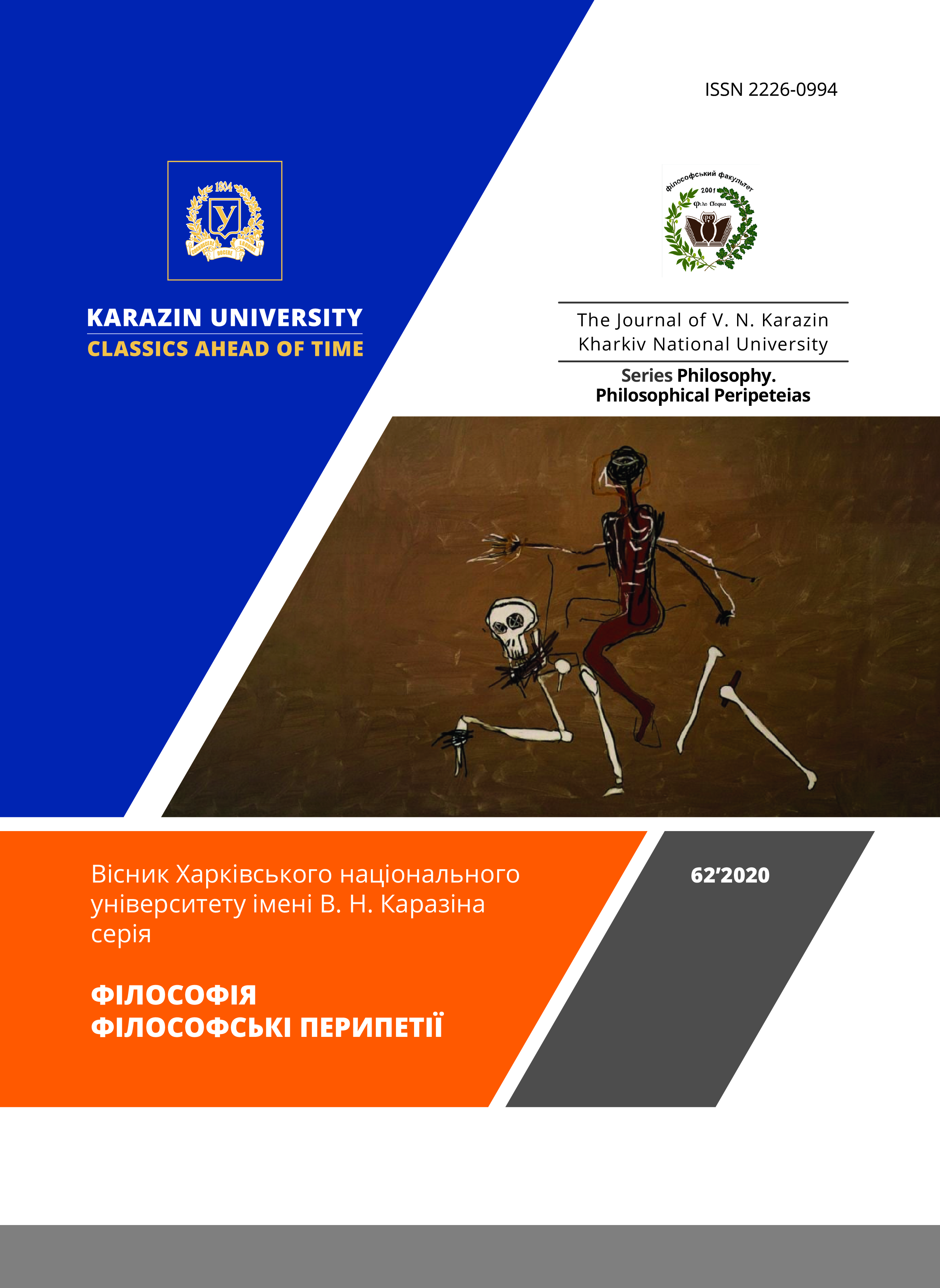THEORY OF JUDGMENT AND PHRONESIS IN PRACTICAL PHILOSOPHY OF HANNAH ARENDT
Abstract
One of the crucial issues of modern universalistic theories of practical philosophy is the theoretical justification of normative principles and moral judgments that enables their universal validity. The problems these theories face are caused by separating rational theorizing from contexts of real life. That is the separation of theoretical justification and practice. The common for modern practical philosophy opposition between universalism and contextualism is reinterpreted today, new theories of post-metaphysical universalism appear that provide the developments of the last universalistic project of discourse ethics in the context of a critical theory of the “third generation”. The purpose of this article is to present the ethical philosophy of Hannah Arendt as the original conception where the Kantian theory of judgment and the Aristotelian notion of phronesis are brought together in order to clarify the nature of ethical and moral statements. This problem, as the article highlights, lies in the understanding of subsumption of particular under universal. Universal judgments according to Arendt are justified in the Kantian theory of “enlarged mentality” as the human capacity to interact in communication and activity. The sensitivity to situations is reflected in the Aristotelian notion of phronesis. As Arendt’s justification of normative and ethical judgments is analyzed, the hermeneutic character of her theory is revealed, which is appropriate for the theory of J. Habermas and modern followers of critical theory. The article provides additional insight into the concept of “public space” as the realm which enables the overlapping of theory and practice. As proved the “public space” in the practical philosophy of Hannah Arendt becomes the realm of mutual ethical and moral thinking where judgments are oriented to the level of the human condition in general. The paper concludes by arguing that Arendt’s conception may overcome the opposition between universalism and contextualism, which is relevant in current ethical discourse.
Downloads
References
/References
Adorno, T. (2000). Problems of Moral Philosophy. (M. L. Khorkov, Trans.). Moscow: Respublica. (Original work published 1967). (In Russian).
Arendt, H. (2000). Vita Activa or about Efficient Life. (V. V. Bibikhin, Trans.). Saint Petersburg: Aletheia. (Original work published 1958). (In Russian).
Arendt, H. (2013). Responsibility and Judgment. (D. Aronson, S. Bardina & R. Huliaiev, Trans.). Moscow: Gaidar Institute Publishing House. (Original work published 2003). (In Russian).
Arendt, H. (2013). The Life of the Mind. (A. Govorunov, Trans.). Saint Petersburg: Nauka. (Original work published 1977). (In Russian).
Aristotle. (1984). Nicomachean Ethics. Big Ethics. (N. V. Brahinskaia & T. A. Miller, Trans.). In Aristotle, The Collected Writings in 4 Vols. (Vol. 2, pp. 53–374). Moscow: Mysl’. (In Russian).
Gadamer, H.-G. (1999). Hermeneutics, Religion and Ethics. (J. Weinsheimer, Trans). New Haven: Yale University Press.
Günther, K. (1993). The Sense of Appropriateness: Application Discourses in Morality and Law. (J. Farrell, Trans.). New York: State University of New York Press.
Habermas, J. (2001). Moral Consciousness and Communicative Action. (D. V. Skliadniev, Trans.). Saint Petersburg: Nauka. (Original work published 1983). (In Russian).
Kant, I. (1994). Groundwork (or Foundations) of the Metaphysics of Morals. In I. Kant, The Collected writings in 8 Vols. (Vol. 4, pp. 154–246). (L. B. D., Trans.). Moscow: Choro. (Original work published 1785). (In Russian).
Kant, I. (2004). Critique of Practical Reason. Kyiv: Universe. (I. Burkovskyi, Trans.). (Original work published 1788). (In Ukrainian).
Адорно Т. Проблемы философии морали / пер. с нем. М. Л. Хорькова. М.: Республика, 2000. 239 с.
Арендт Х. Vita activa, или о деятельной жизни / пер. с нем. и англ. В. В. Бибихина. СПб.: Алетейя, 2000. 437 c.
Арендт Х. Жизнь ума / пер. с англ. А. В. Говорунова. СПб.: Наука, 2013. 517 с.
Арендт Х. Ответственность и суждение / пер. с англ. Д. Аронсона, С. Бардиной, Р. Гуляева. М.: Изд.-во Института Гайдара, 2013. 352 с.
Аристотель. Никомахова этика. Большая этика / пер. Н. В. Брагинская, Т. А. Миллер. Аристотель. Сочинения: в 4 т.; т. 4. М.: Мысль, 1984. С. 53–374.
Кант И. Основоположения метафизики нравов / пер. с нем. Л. Б. Д. Кант И. Сочинения: в 8-ми т.; т. 4. М.: Чоро, 1994. C. 154–246.
Кант І. Критика практичного розуму / пер. с нім., прим. та післямова І. Бурковського; наук. ред. А. Єрмоленко. К.: Юніверс, 2004. 240 с.
Хабермас Ю. Моральное сознание и коммуникативное действие / пер. с нем. Д. В. Скляднева. СПб.: Наука, 2001. 377 с.
Gadamer H.-G. Hermeneutics, Religion and Ethics / transl. by J. Weinsheimer. New Haven: Yale University Press, 1999. 173 p.
Günther K. The Sense of Appropriateness: Application Discourses in Morality and Law / transl. by J. Farrell. New York: State University of New York Press, 1993. 353 р.

This work is licensed under a Creative Commons Attribution 4.0 International License.
Authors who publish with this journal agree to the following terms:
- Authors retain copyright and grant the journal right of first publication of this work under the terms of a license Creative Commons Attribution License 4.0 International (CC BY 4.0).
- Authors are able to enter into separate, additional contractual arrangements for the non-exclusive distribution of the journal's published version of the work (e.g., post it to an institutional repository or publish it in a book), with an acknowledgement of its initial publication in this journal.
- Authors are permitted and encouraged to post their work online (e.g., in institutional repositories or on their website) prior to and during the submission process, as it can lead to productive exchanges, as well as earlier and greater citation of published work.






3.gif)




